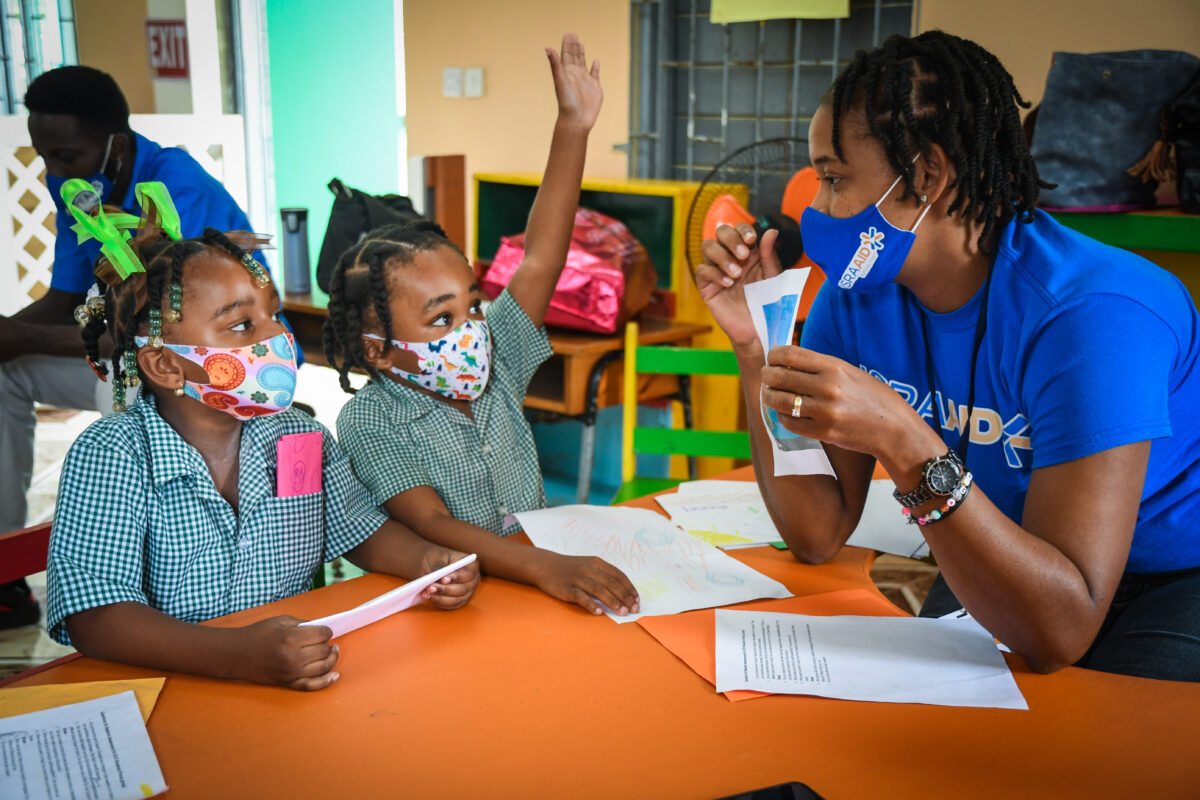When Hurricane Maria hit Dominica six years ago, no one on the small Caribbean island was left unaffected. The Category 5 storm destroyed homes and took down electricity and telephone lines. Flooded roads left entire communities cut-off.
It was Erev Yom Kippur when the Beverly Foundation and IsraAID agreed to launch an emergency response. IsraAID’s CEO Yotam Polizer asked, “You know tomorrow’s a holiday. Will you work on Yom Kippur?” The answer was clear, of course. This was pikuach nefesh: people’s lives were at stake, and there was a lot of work to do.
Image of the aftermath of Hurricane Maria on the island country of Dominica in the Caribbean.
The Beverly foundation is a small family foundation based in Minneapolis, with a long history supporting Dominica and other grantees. Beverly Deikel, the founder, previously built and ran a small eco-resort on the island with her Dominican partner, and her foundation has been supporting local organizations there for over 20 years. IsraAID is an Israel-based humanitarian aid organization that responds after emergencies and supports communities during the long-term recovery. Since their founding in 2001, they’ve worked in over 60 countries, and responded to over 100 emergencies.
The partnership that began that holiday evening redefined for us what the relationship between donors and aid groups can look like. It helped us realize that it’s not just the big players that can make a difference. With the right partner and the right working relationships, small family foundations and NGOs together have the ability to make an incredible difference for communities.
In the first months after the hurricane, we patched roofs, distributed supplies, helped the schools reopen, provided medical support and worked to protect the most vulnerable communities. After the initial emergency response, there was still a long road to recovery; so the Beverly Foundation and IsraAID made a five-year commitment to a trust-based philanthropy framework, guided by a rough strategic plan. Our goals were to leverage every dollar and collaborate with as many partners as possible, address the power imbalance through true partnership, make the reporting process easy and be transparent and responsive by working together with our community and in our community. The foundation offered support beyond the dollar in every way possible.
Over the last five years, we worked together with the Dominican government and local partners to support their goal of becoming the world’s first climate resilient economy. Dominica is a small island at risk from a huge number of natural hazards, susceptible to hurricanes, landslides, earthquakes and volcanic eruptions. Disasters are becoming ever more common as the climate crisis brings stronger and more frequent storms to the area. Rather than resigning themselves to an inevitable cycle of devastation, Dominicans have chosen to adapt and we committed to supporting that effort.
Today, we’ve worked with every school on the island to ensure they’re as prepared as possible for all kinds of future disasters. Every school now has an emergency response plan and the resources to deliver it, including the additional needs of children with physical and learning disabilities. This includes workbooks, teaching plans, emergency drills and training sessions, all of which equip teachers, parents and caregivers with the tools they need to keep their communities safe.
Our income-generation programs are helping Dominicans build both traditional and digital careers that don’t depend on tourism. We’ve worked to help the economy endure the disruptions that come with disasters. These programs encourage young Dominicans to envision their future on the island, and reduce economic pressures to consider emigration.
Finally, our teams continue to respond to emergencies and disasters as they occur. Thanks to our deep relationships with communities across the island, we’ve become a reliable presence.

This partnership has been marked by an approach rooted in trust-based philanthropy practiced by the Foundation, which includes a multi-year, unrestricted grant, with an understanding that finding real solutions, especially in an age of mounting climate crises, requires the ability to try new things, fail, and try again.
Usually, donors give money and organizations do the work, but this is a shared vision together with the Dominicans. We didn’t make the decisions by ourselves — we made them together with our local partners. The trust relationship extends beyond just donor and grantee to the community as well. It’s about all three coming together to work through the stages of disaster relief.
Many aid organizations and communities are struggling to adapt to the increasing pace of climate disasters. Often, new emergencies strike before communities have recovered from the last one. For funders, it’s no longer just a question of giving more. It’s a matter of giving better.
Giving better means allowing organizations the stability of multi-year commitments, the flexibility to adapt to a changing situation and the trust to try new and innovative solutions. It also means really working with and integrating into the community, listening more than we speak and committing ourselves to the future the community envisions for itself.
Today, on Erev Yom Kippur 2023, we’re happy to say we’ve committed to another five years together in Dominica. Dominica’s success has grown beyond the island itself and is now an example of climate resilience in one of the world’s most vulnerable regions. We are excited and proud to support this community as they begin sharing their hard-earned expertise with their neighbors.
Amy Rosenblatt Lui is executive director of the Beverly Foundation, and Tamar Kosky Lazarus is the chief development and communications officer for IsraAID.
Credit:Source link




